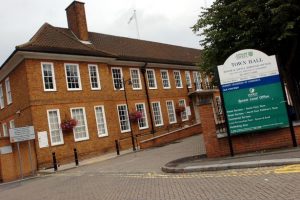When is a question not a question? This issue was the subject of heated discussion at the 2nd February meeting of the Epsom and Ewell Borough Council’s Audit and Scrutiny Committee. Former Stamford Ward councillor Previn Jagutpal, who resigned his seat in December, used the council’s procedures to ask a question at the start of the meeting: “When an outside agency such as … the Local Government Ombudsman [LGO] makes a determination about the functioning of this council, what is the process for the Chair of Scrutiny … to be informed?”
The chair, Cllr. Steve Bridger (RA, Stamford Ward), referred the question to a legal officer attending the meeting. “I believe the process,” the officer reported, “is that there’s going to be an annual report which will come to the committee which reports on any decisions made by the Ombudsman.”
Invited to ask a supplementary question, Mr. Jagutpal, then asked the Chair if he was “satisfied that all communications from outside agencies such as … the LGO in your 4 years as Chairman of this committee have followed that process and you have been informed of all such decisions?”
The Chair was again prompted. “You will receive a written answer in due course,” he said.
Mr. Jagutpal then requested to ask a second question. However, the officer ruled that his supplementary question was his second question. Mr Jagutpal argued that, according to the council’s constitution, a question followed by a supplementary question is one question, then a second question may be asked. But the officer responded that “You have asked a second question. There are no further questions we can answer tonight.”
“Are you going to deny me my constitutional right?” Mr Jagutpal asked. “As far as tonight, that’s it in terms of questions,” ruled the officer and Mr. Jagutpal left the council chamber.
Cllr. David Gulland (Lib Dem, College Ward) wanted to discuss the matter further “Obviously that question and the answers raised further questions in many of our minds,” he said and asked if the committee could discuss the matter.
Another pause from the chair was followed by “No, we continue with the agenda.”
But Cllr Gulland was not so easily put off. During the course of the evening he asked many other questions relating to the information being provided to the Committee and the Council’s internal processes. But he left his most damning speech for the final agenda item.
“Under the constitution,” he argued, “the monitoring officer is meant to report to all councillors on any breach of regulation or of data protection or where the ombudsman has reported it to us … I had to go and look for it, [but] I’ve found the letter of 20th July 2022 from the ombudsman to our interim chief executive, a public document, [which says that] ‘during the year your council failed to respond in time to our correspondence during three investigations. On each occasion, we had to escalate the matter internally and were forced to consider issuing a witness summons and a public report for non-compliance. Such delays in our investigation undermine our role and can result in further distress to complainants.’
“There’s a big elephant in the room,” Cllr. Gulland continued, “that our processes are not working and, more importantly, this committee has not been told about that. I would welcome comments from the chairman or the officer about my comments on the ombudsman and also about data protection issues.”
Again, it was the officer who responded. “You are referring to an old letter from the ombudsman,” he said, the letter being barely more than six months old. “I’m very happy to look into that. We’ll come back to you on issues about data protection.”
The July 2022 letter from the LGO acknowledges the challenges faced by local councils coping with pandemic working practices and the impact on services. The LGO seeks to encourage and assist EEBC in improving its procedures.
Meanwhile, members of the public and possibly even members of the committee may remain in the dark about possible breaches of regulations.
When is a question not a question? You decide. These are the relevant paragraphs from the council’s constitution:
1.9 At the Meeting the Chair/Chairman will ask the questioner if the response
answers their concern or if they wish to ask one supplementary question. If a
supplementary question is asked, it must arise from the reply given.
1.11 If a member of the public asks or wishes to ask more than one question, their
second question (written or oral) shall be taken after all other individuals who
wish to ask a question have been given the opportunity to do so.
Related Reports:
Man wrongly labelled ‘vexatious complainant’ by Epsom and Ewell Council


